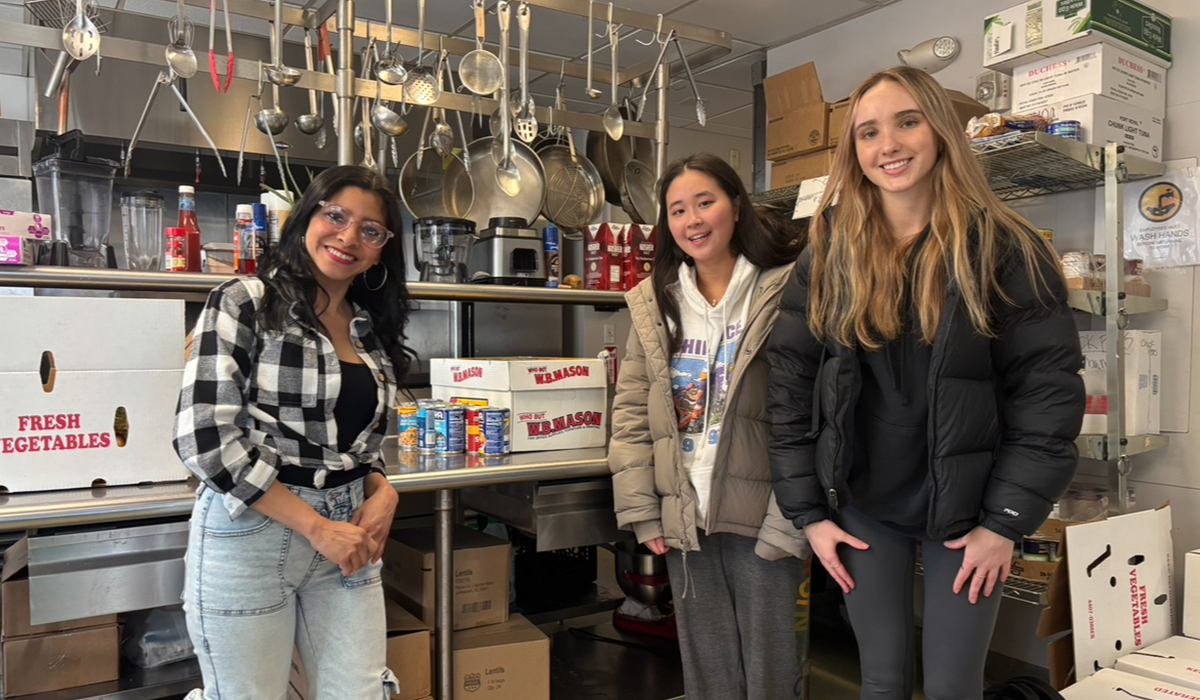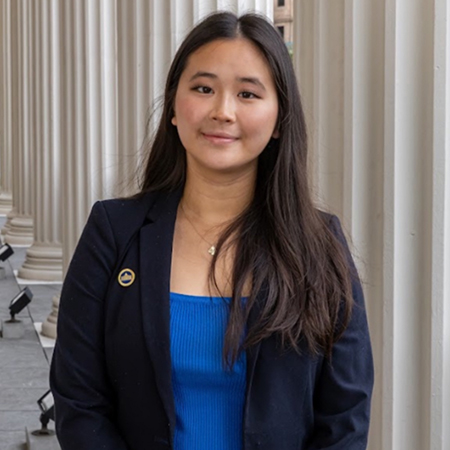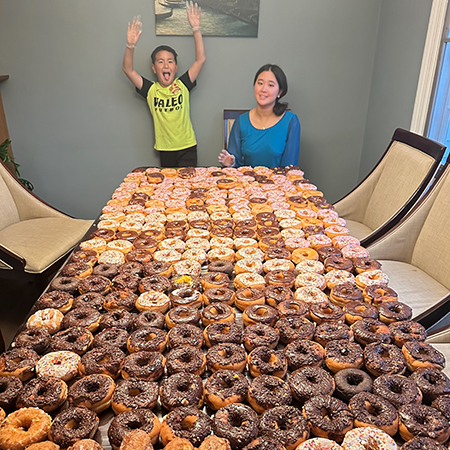MAKING FOOD WASTE A THING OF THE PAST

Meet Daily Point of Light Award honoree Arianna Sun. Read her story, and nominate an outstanding volunteer or family as a Daily Point of Light.
Arianna Sun is still in high school, but she’s already creating a revolution. Growing up, Arianna would sit at the dinner table and hear her grandfather’s stories about growing up during the Great Famine in China. Already shocked by the level of starvation he survived, Arianna was amazed to discover the amount of food waste that occurs in her own community. Already a frequent volunteer serving meals to hungry people at her local church, she saw how local restaurants would throw out untouched food at the end of the day. The fact that people were hungry right in her own neighborhood, while good food was being thrown away, planted a seed inside Arianna. She decided to take action.
Arianna founded NoVasta, a youth-led organization that focuses on direct donations through food rescue and food donations alongside policy advocacy. Originally a club at her school, the group has blossomed tremendously. Arianna forged relationships with local restaurants, collecting their unsold food and pastries at closing time and delivering them to nearby shelters or directly to people on the streets. This is no small feat, as many restaurants are concerned with laws restricting them from giving away uneaten food. But Arianna didn’t stop pursuing these relationships, and she ultimately succeeded. As the organization grew, it expanded across the country and eventually went worldwide. Since its establishment in Arianna’s sophomore year of high school, NoVasta has donated over 8,500 meals that would have otherwise gone to the landfill.
Now a high school senior, Arianna manages her busy school responsibilities while running NoVasta. But she doesn’t mind doing so much; Instead, she says being so passionate about something allows her to make time for it in her daily schedule.
Arianna’s work with NoVasta is also informing her future. Already a member of Massachusetts Governor Maura Healey’s Anti-Hunger Task Force, Arianna is looking to study policy when she graduates high school next year. When she goes to college, she hopes to learn more about how she can help create solutions to food waste and food insecurity, and the role the government can play in changing these issues. Arianna’s hard work is a great example of how volunteer work can build a tremendous foundation that ultimately serves as a building block to our future.

What inspired you to get started with this initiative?
A huge part of the reason I founded this organization was because of my grandfather. Growing up, he always told me about his experience growing up during the Great Famine in China. At the dinner table, he would tell me not to waste a single thing. That shaped how I view the systems in this world, and also a lot of the inequities. I can recognize the food waste that goes on, and I’m able to see a lot of food insecurity in our community.
Also, a huge part of it came from volunteering. We used to spend hours upon hours making meals for people. Then, on my way home, I’d pass restaurants and I’d see them throwing away bags and bags of food. It felt really wrong to me, because I saw so much need in one place and then so much waste right next to it. That really inspired me to try to bridge that disconnect.
What inspires you to volunteer?
I think volunteer work is really, really important. A huge part of it is how it connects the community. Especially in this day and age, a lot of our interactions have been limited to online platforms. I think it’s more crucial than ever to get involved in organizations and volunteer work that you care about, because through those organizations and experiences, you’re able to not only find people who care about the same thing as you, but you also learn so much about the community as well.
Tell us about your volunteer role with NoVasta.
With NoVasta, we started in Boston as a club. Since then, we’ve expanded to an organization spread across the United States and a lot of different countries. A day-to-day of what my role looks like is overseeing around 20 chapters across the world and coordinating over 400 members. I help organize a lot of food rescue operations and connect volunteers with their local shelters. We help lead a lot of advocacy efforts through the Zero Food Waste Coalition. Another huge part of the work I do is local community work within Boston. I’m involved and partnered with a lot of the restaurants in my community, and I’m able to bring that excess food to local shelters. It’s been really rewarding being involved with my community.
What are your long-term plans or goals for the organization?
Once I go to college, I want to bring the mission of NoVasta there. I think a huge part of our long-term goal is bringing this to a lot of different cities. Food waste and food insecurity are definitely not problems that are unique to Boston. I think it’s something that exists in every city around the world, and if we’re able to bring that to more communities, that would be really, really great.
What’s been the most rewarding part of your work?
One of the most rewarding parts has been seeing the interactions that our volunteers can make, and also my interactions with people. One huge accomplishment has been my being invited to serve on Governor Healey’s Anti-Hunger Task Force. I felt that was a huge recognition that young people and youth can have a seat at the table and solve a lot of statewide challenges. I would say the daily rewards that come from the people I meet are what’s most rewarding, because I’m able to talk to restaurant owners who start to donate regularly or a community member who’s able to receive a meal from us.

What have you learned through your experiences as a volunteer?
What goes on behind one issue and how interconnected direct service and policy really are. Through NoVasta, I’ve learned the logistics of moving food efficiently. Through the Anti-Hunger Task Force, I’ve learned how government and community partners can collaborate to make that work sustainable. I’ve learned that progress requires a lot of persistence, especially in building these partnerships. It’s not enough to just rescue the food. In the long term, we have to change a lot of the systems that are in place that create the waste in the first place.
Why is it important for others to get involved with causes they care about?
Being able to see and identify a problem in your community and being able to actually be a part of that solution is really meaningful work. I think if our organization is anything, it’s a testament that you can truly make a change with just the willingness to change something.
What do you want people to learn from your story?
How powerful collaboration can be between restaurants, volunteers, shelters and your local policy makers. Another thing I hope people can take away is that there is definitely a disconnect in our communities. Sometimes, waste and need are right next to each other. But what I want people to take away is that by being a volunteer, you can be the bridge between those issues, and you’re able to solve so many things that you see wrong in a community.
Do you want to make a difference in your community like Arianna? Find local volunteer opportunities.